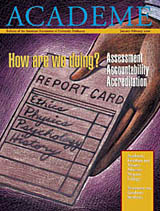 AAUP tries to help faculty involved in disputes.
AAUP tries to help faculty involved in disputes.
Locally, contact a chapter officer.
At the national office, Committee A staff provides advice and can help resolve disputes, especially when there have been violations of due process or AAUP guidelines. Commitee A (on Academic Freedom and Tenure) receives more than 1,000 complaints a year. Some are resolved easily. In cases that involve issues of academic freedom or other core principles, the national office can initiate an investigation and, if the situation warrants, Committee A can impose a censure (more on Committee A and list of censured schools).
If you have a problem you may call that national office and ask for the Committee A staff: 202-737-5900.
What follows are some points of advice that can prove useful to those involved in disputes:
-
Consult the Secretary of the Faculty. This office is currently held by Professor Mike Townsend. The Secretary of the Faculty is charged with interpreting the Faculty Code and can fairly advise about employment rights and procedures. Chairs, unit directors and deans cannot and should not be called upon to provide such advice. The Secretary of the Faculty can be contacted at the Faculty Senate office, 36 Gerberding Hall, 543-5939.
- The UW Ombud’s office serves the entire University of Washington community by providing a collaborative and confidential environment to discuss your situation, consider options, and develop a plan for the future.
-
Read the Faculty Code and also the relevant AAUP guidelines. These are compiled in the AAUP Red Book. Most are available at the AAUP national office web site.
-
Disputes are most easily resolved at the lowest level, with chairs or deans, but do not overlook deadlines or allow procedures to become casual. Settlement offers need to be in writing.
-
Chapter 24 of the Faculty Code now mandates regular conferences with your department chair and gives considerable weight to the chair’s report of that meeting. If you object to any of its contents, submit a written objection to your chair immediately. Failure to reply in writing within 10 days constitutes official acceptance of its terms and conditions.
-
The Faculty Code provides for two formal mechanisms of dispute resolution: conciliation (chapter 27) and adjudication (chapter 28). Conciliation is not wise in every case, even as a first step. This approach often involves “splitting the difference.” Half of tenure is not much.
-
There are two types of adjudication, brief and comprehensive. In brief adjudication a hearing officer (an attorney hired by the University) decides the issue. This person may or may not understand the faculty system. In comprehensive adjudication, decisions are made by a five member faculty panel. In very serious or complicated cases, comprehensive adjudication is usually best.
-
If the issue is serious and you can afford to do so, it is a good idea to consult an attorney.
